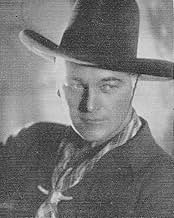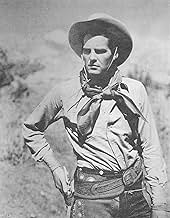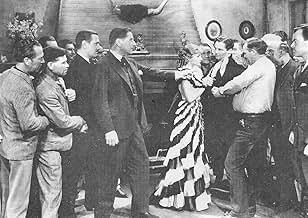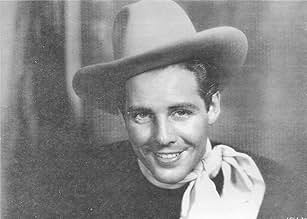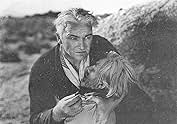An evil ranch foreman tries to provoke a range war by playing two cattlemen against each other while helping a gang to rustle the cattle.An evil ranch foreman tries to provoke a range war by playing two cattlemen against each other while helping a gang to rustle the cattle.An evil ranch foreman tries to provoke a range war by playing two cattlemen against each other while helping a gang to rustle the cattle.
- Director
- Writers
- Stars
James Ellison
- Johnny Nelson
- (as Jimmy Ellison)
George 'Gabby' Hayes
- Uncle Ben
- (as George Hayes)
Sid Jordan
- Wrangler
- (uncredited)
Pascale Perry
- Outlaw Guard
- (uncredited)
Joe Phillips
- Party Guest
- (uncredited)
Monte Rawlins
- Cowhand Party Guest
- (uncredited)
- Director
- Writers
- All cast & crew
- Production, box office & more at IMDbPro
Featured reviews
William Boyd, a hugely popular actor during the silent film era, saw his career wilting in the early 1930s after a mix-up by a newspaper sent his reputation spiraling downwards. When he auditioned for Paramount Pictures' low-budgeted Western, August 1935 "Hop-Along Cassidy," the studio offered him the role as one of the ranch supervisors-but not the lead. Boyd knew his on-screen magnetic personality was perfect for the series' hero, and lobbied hard for the role as Bill Hop-Along Cassidy. The actor eventually beat out his competition, and the life-changing role became one of Hollywood's more feel-good stories in cinema.
Western movies had been relegated to 'Poverty Row" status ever since the spectacular failure of Raoul Walsh's 1930 "The Big Trail." The Grade B "program westerns" were quickly churned out with their low quality camerawork and acting, and played in largely rural theaters. Paramount Pictures wanted to elevate the genre by producing a series with upgraded storylines, higher production values and more polished acting. The studio eventually realized Boyd's past film experience was an asset to achieve its goals. At first the part was offered to James Gleason (not the comedian), but the actor had just signed a deal with RKO and was handcuffed. Once Boyd got the role, the series became a long-lasting fan favorite right from its premier, lasting well beyond going to the new medium of television in 1948. Hopalong Cassidy's programing is credited for making Westerns the most popular genre in the early days of TV.
Boyd first appeared in film in 1918, and was a favorite of director Cecil B. DeMille in his role as Simon in 1927's "The King of Kings." His lead in 1926's silent "The Volga Boatman," DeMille's personal favorite, solidified Boyd's reputation when cinema transitioned to talkies. But RKO cut him loose when its executives read a newspaper account alongside Boyd's picture that he was arrested on gambling and illegal alcohol charges. The editors mixed him up with another actor named William 'Stage" Boyd, who was the real culprit. Yet, when the paper published a correction, "The damage was already done," Boyd lamented. No studio wanted to touch him until 'Stage' Boyd died in 1935, coincidently the same year William earned the Cassidy role.
Boyd's portrayal of Hopalong didn't resemble the title character in Clarence Mulford's 1904 stories. The author's Western hero was rude, rough in speech, and constantly had a chip on his shoulder. The literary character sustained a bullet embedded in his leg during a gunfight, causing him to hop while he walked, earning the nickname 'Hopalong.' Boyd's 'Hopalong' on the screen was civil, friendly, and well-spoken. He consistently appeared on the scene whenever crooks were making honest people's lives miserable. Cassidy was accompanied by a younger man, Johnny, first played by James Ellison, who was always getting into trouble but had a yen for women in distress, along with a grizzled old man first played by actor George 'Gabby' Hayes.
Boyd played in 66 Hopalong Cassidy one-hour movies. When Hollywood studios phased out low-budget films by the time television became popular in 1948, they stopped producing Hopalong features (Boyd financed the final 12 episodes himself.). The actor, though, saw a market for those 66 Hopalong films, and mortgage everything he had, $350,000, to buy the entire catalogue from the studio. The unemployed actor Boyd approached NBC to see if the network was interested in playing some of his old Westerns. Looking for programming to fill its new medium, NBC agreed to air them for a nominal fee. A new generation of viewers grew to love the action-packed films which were shown on Sunday nights. These weekly Sunday evening one-hour Westerns became known as 'Hoppy Nights,' and Boyd emerged as one of TV's first stars, earning not only a fortune for his ownership of the series but he also received lucrative licensing contracts to market Hopalong merchandise.
In the inaugural debut of Hop-along (the only film with a hyphen in his name), Bill Cassidy works for the Bar 20 Ranch, which sees its cattle stolen one-by-one. At a nearby ranch, H2, its foreman, Jack Anthony (Kenneth Thomson), is a cattle rustler leading his gang to steal. He's blaming the Bar 20 Ranch employees for the loss of their cattle, and the two ranches soon become embroiled by Anthony's maneuvers. Writes film reviewer Laura Grieve, "All in all, it's a strong film which set a firm foundation for the many Hopalong Cassidy films and TV episodes to follow."
The character Hopalong Cassidy was nominated by the American Film Institute as one of movie's Heroes of All-Time.
Western movies had been relegated to 'Poverty Row" status ever since the spectacular failure of Raoul Walsh's 1930 "The Big Trail." The Grade B "program westerns" were quickly churned out with their low quality camerawork and acting, and played in largely rural theaters. Paramount Pictures wanted to elevate the genre by producing a series with upgraded storylines, higher production values and more polished acting. The studio eventually realized Boyd's past film experience was an asset to achieve its goals. At first the part was offered to James Gleason (not the comedian), but the actor had just signed a deal with RKO and was handcuffed. Once Boyd got the role, the series became a long-lasting fan favorite right from its premier, lasting well beyond going to the new medium of television in 1948. Hopalong Cassidy's programing is credited for making Westerns the most popular genre in the early days of TV.
Boyd first appeared in film in 1918, and was a favorite of director Cecil B. DeMille in his role as Simon in 1927's "The King of Kings." His lead in 1926's silent "The Volga Boatman," DeMille's personal favorite, solidified Boyd's reputation when cinema transitioned to talkies. But RKO cut him loose when its executives read a newspaper account alongside Boyd's picture that he was arrested on gambling and illegal alcohol charges. The editors mixed him up with another actor named William 'Stage" Boyd, who was the real culprit. Yet, when the paper published a correction, "The damage was already done," Boyd lamented. No studio wanted to touch him until 'Stage' Boyd died in 1935, coincidently the same year William earned the Cassidy role.
Boyd's portrayal of Hopalong didn't resemble the title character in Clarence Mulford's 1904 stories. The author's Western hero was rude, rough in speech, and constantly had a chip on his shoulder. The literary character sustained a bullet embedded in his leg during a gunfight, causing him to hop while he walked, earning the nickname 'Hopalong.' Boyd's 'Hopalong' on the screen was civil, friendly, and well-spoken. He consistently appeared on the scene whenever crooks were making honest people's lives miserable. Cassidy was accompanied by a younger man, Johnny, first played by James Ellison, who was always getting into trouble but had a yen for women in distress, along with a grizzled old man first played by actor George 'Gabby' Hayes.
Boyd played in 66 Hopalong Cassidy one-hour movies. When Hollywood studios phased out low-budget films by the time television became popular in 1948, they stopped producing Hopalong features (Boyd financed the final 12 episodes himself.). The actor, though, saw a market for those 66 Hopalong films, and mortgage everything he had, $350,000, to buy the entire catalogue from the studio. The unemployed actor Boyd approached NBC to see if the network was interested in playing some of his old Westerns. Looking for programming to fill its new medium, NBC agreed to air them for a nominal fee. A new generation of viewers grew to love the action-packed films which were shown on Sunday nights. These weekly Sunday evening one-hour Westerns became known as 'Hoppy Nights,' and Boyd emerged as one of TV's first stars, earning not only a fortune for his ownership of the series but he also received lucrative licensing contracts to market Hopalong merchandise.
In the inaugural debut of Hop-along (the only film with a hyphen in his name), Bill Cassidy works for the Bar 20 Ranch, which sees its cattle stolen one-by-one. At a nearby ranch, H2, its foreman, Jack Anthony (Kenneth Thomson), is a cattle rustler leading his gang to steal. He's blaming the Bar 20 Ranch employees for the loss of their cattle, and the two ranches soon become embroiled by Anthony's maneuvers. Writes film reviewer Laura Grieve, "All in all, it's a strong film which set a firm foundation for the many Hopalong Cassidy films and TV episodes to follow."
The character Hopalong Cassidy was nominated by the American Film Institute as one of movie's Heroes of All-Time.
A range war is brewing between the Bar 20 and Meeker ranches, which is being caused by Meeker's foreman Anthony (who is in reality, an outlaw called the Pecos Kid), whose method is to have each ranch be accused at acts of rustling cattle or murder, then the two ranches will start a war against each other. In the meanwhile, Anthony's gang will round up all the cattle from the two ranches, change brands, and sell them at market. It's up to Hoppy, Red, Uncle Ben, and Johnny Nelson (who is a target for Meeker's hands since Johnny is sweet on Meeker's daughter Mary) to clear the Bar 20's name and round up the outlaws. The film is a very good entry in the opening film of the Hopalong series, but far from the best, since the action doesn't really begin past the halfway point of the film. Then on it's gets better building up to a great climax. Good performances by the cast (especially by Hayes as Uncle Ben, in a pre Windy Halliday role), but Thomson is miscast and ineffective as Anthony. Rating, based on B westerns, 6.
William Boyd made his screen debut as Hopalong Cassidy in Hop-ALong Cassidy. He was really William known as Bill Cassidy when he does arrive, but he gets wounded in a gunfight and limped a bit for the duration of the film. The guys in the bunkhouse called him Hopalong after he gave himself that nickname. Throughout the rest of the 66 films and TV shows we rarely heard his Christian name.
The plot is a standard western one, an outlaw gang stirs up a feud between the Bar 20 and a neighboring outfit owned by Robert Warwick. But it takes Bill Boyd to come up with the solution, aided and abetted by James Ellison whom he acquires as a sidekick.
Gabby Hayes is in this as Uncle Ben and he's the usual Gabby Hayes. He proved so popular that Paramount just resurrected him for the next few years before he left the series. Here as the chief villain guns him down it shows the Saturday matinée kids just how dastardly he is. Rather stupidly he leaves him to bleed out rather than finish him off. I guess Paramount did not want to shock the kids whose dimes to see the film and the subsequent series planned.
So Hopalong Cassidy becomes an American institution. Curiously enough Bill Boyd did a few non-Hoppy films after this before settling down into this character permanently.
It was a good beginning for an American institution.
The plot is a standard western one, an outlaw gang stirs up a feud between the Bar 20 and a neighboring outfit owned by Robert Warwick. But it takes Bill Boyd to come up with the solution, aided and abetted by James Ellison whom he acquires as a sidekick.
Gabby Hayes is in this as Uncle Ben and he's the usual Gabby Hayes. He proved so popular that Paramount just resurrected him for the next few years before he left the series. Here as the chief villain guns him down it shows the Saturday matinée kids just how dastardly he is. Rather stupidly he leaves him to bleed out rather than finish him off. I guess Paramount did not want to shock the kids whose dimes to see the film and the subsequent series planned.
So Hopalong Cassidy becomes an American institution. Curiously enough Bill Boyd did a few non-Hoppy films after this before settling down into this character permanently.
It was a good beginning for an American institution.
Although the Character of Hopalong Cassidy had Virtually Nothing in Common with the Author Clarence Mulford's Novels...
William Boyd and "Hoppy" Maintained one of the Most Popular and Long Running Character Features in Movie History...(66 Films & TV).
"Hoppy" in the Movies Did Not...Smoke, Drink, or Result to Violence Unless Provoked and the "Bad Guy" Drew or Punched First.
A Complete Opposite of Mulford's "Hoppy", A Grizzled, Tobacco Chewing, Ruffian.
Unrealistic to a Fault, but Not as Unrealistic as say Gene Autry, Roy Rogers or Other Kid's Heroes of the Day.
It's Not Easily Understood Why the Character was So Popular.
His Outfit was Black from Head to Toe, and sure was the Antithesis of Gene and Roy where Only the Bad-Guys Wore Black.
It was a Stunning Contrast to His Horse "Topper" an All-White Stallion.
Add to That Boyd's Hair was Completely Premature White.
These Things Certainly Helped the "Hoppy" Image.
Although Extremely Popular in His Initial Reincarnation with a Steely-Stare and an Edge,
"Hoppy's" Entrance is a Thrilling Descent Down a Steep Decline Aboard "Topper".
Boyd's "Hoppy" Became More and More Docile as the Character and the Film-Series Aged.
This First Entry, was Re-Titled "Hopalong Cassidy Enters" in Re-Release to Point Fans to the Origin,
is a Visual-Treat with Wide-Open Spaces and Horses Always Moving, Bucking, and Galloping.
The Plot Has Mystery Elements and George "Gabby" Hayes as "Uncle Ben"
Makes for a Sentimental and Emotional Touch with One-Scene Unforgettable.
For B-Western Fans...A Must See.
William Boyd and "Hoppy" Maintained one of the Most Popular and Long Running Character Features in Movie History...(66 Films & TV).
"Hoppy" in the Movies Did Not...Smoke, Drink, or Result to Violence Unless Provoked and the "Bad Guy" Drew or Punched First.
A Complete Opposite of Mulford's "Hoppy", A Grizzled, Tobacco Chewing, Ruffian.
Unrealistic to a Fault, but Not as Unrealistic as say Gene Autry, Roy Rogers or Other Kid's Heroes of the Day.
It's Not Easily Understood Why the Character was So Popular.
His Outfit was Black from Head to Toe, and sure was the Antithesis of Gene and Roy where Only the Bad-Guys Wore Black.
It was a Stunning Contrast to His Horse "Topper" an All-White Stallion.
Add to That Boyd's Hair was Completely Premature White.
These Things Certainly Helped the "Hoppy" Image.
Although Extremely Popular in His Initial Reincarnation with a Steely-Stare and an Edge,
"Hoppy's" Entrance is a Thrilling Descent Down a Steep Decline Aboard "Topper".
Boyd's "Hoppy" Became More and More Docile as the Character and the Film-Series Aged.
This First Entry, was Re-Titled "Hopalong Cassidy Enters" in Re-Release to Point Fans to the Origin,
is a Visual-Treat with Wide-Open Spaces and Horses Always Moving, Bucking, and Galloping.
The Plot Has Mystery Elements and George "Gabby" Hayes as "Uncle Ben"
Makes for a Sentimental and Emotional Touch with One-Scene Unforgettable.
For B-Western Fans...A Must See.
"Hop-a-Long Cassidy" is the first appearance of this western hero. In all, William Boyd made 66 of these films and they tended to be among the better B-series films of the era.
When the story begins, there's some tension between two ranchers...to the point that you know sooner or later violence is going to break out and someone's going to get killed. Into this mess arrives Hopalong who has been summoned by one of the ranchers to help deal with this situation. What no one realizes is that one of the foremen is deliberately stoking fires on both sides...and while the ranches are fighting each other, the foreman and his henchmen are rustling their cattle! Fortunately, Hoppy is NOT a guy to jump headfirst into the problem and his slow, cautious approach is bound to bring answers.
This film is quite different from films from the likes of Gene Autry and Roy Rogers. This is no singing cowboy picture and it also is a good bit more violent than most of them as well...with a hanging, plenty of shootings and more! It all makes for a very exciting and more realistic sort of B-western. And, like a B, it runs at about one hour and is relatively low-budgeted...though it does sport an amazingly good cast for such an effort.
When the story begins, there's some tension between two ranchers...to the point that you know sooner or later violence is going to break out and someone's going to get killed. Into this mess arrives Hopalong who has been summoned by one of the ranchers to help deal with this situation. What no one realizes is that one of the foremen is deliberately stoking fires on both sides...and while the ranches are fighting each other, the foreman and his henchmen are rustling their cattle! Fortunately, Hoppy is NOT a guy to jump headfirst into the problem and his slow, cautious approach is bound to bring answers.
This film is quite different from films from the likes of Gene Autry and Roy Rogers. This is no singing cowboy picture and it also is a good bit more violent than most of them as well...with a hanging, plenty of shootings and more! It all makes for a very exciting and more realistic sort of B-western. And, like a B, it runs at about one hour and is relatively low-budgeted...though it does sport an amazingly good cast for such an effort.
Did you know
- TriviaWilliam Boyd was originally offered the role of Buck Peters, the Bar 20 ranch foreman, but chose the role of Cassidy.
- ConnectionsEdited into Border Justice (1951)
- SoundtracksFollowin' the Stars
Music and lyrics by Sam H. Stept and Dave Franklin
Sung by James Ellison and Frank McGlynn Jr.
Played as background music often
Details
Box office
- Budget
- $85,000 (estimated)
- Runtime1 hour
- Color
- Aspect ratio
- 1.37 : 1
Contribute to this page
Suggest an edit or add missing content



